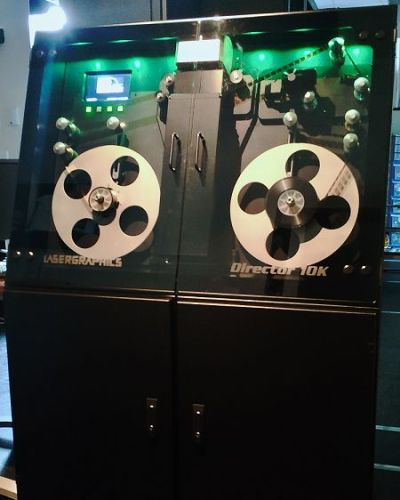Park Road Post Goes 10K with Lasergraphics

Wednesday February 26, 2020 10:57
For over 25 years, New Zealand’s Park Road Post Production has been involved with many of the world’s top movies, and continues to lead the industry with state-of-the-art digital technology. It might be surprising to learn then, that film still plays a central role in Park Road Post’s business.
According to Director of Engineering Ian Bidgood, “Film has always been an important part of Park Road Post’s workflow. In the early days, most of what we did started on film in the camera and finished on film for the cinema. For many years, we ran our own film lab before the move to digital acquisition made it uneconomical. But film still remains an important part of the production process for many projects that Park Road Post is involved with.”
In fact, half of the 2020 Oscar nominees for Best Picture were shot on film. Additionally, restoring older films is a growing part of Park Road’s business. A prime example is They Shall Not Grow Old, Peter Jackson’s recent documentary feature made up entirely of 100-year-old WWI archival footage. Park Road is working on newer material as well, including film material to be released in High Dynamic Range.
Bringing film sources new and old into an advanced digital post production workflow demands careful attention to detail to ensure that every nuance of the original master is captured.
According to Bidgood, “two of the key benefits with film are its resolution and its dynamic range. Once we have that in the digital realm, we can then manipulate it to achieve the best result, but first we need to be able to capture the image from film at the best possible quality and this is where we found the Director from Lasergraphics excelled.”
For many years Park Road has relied on their venerable ARRISCAN film scanner to achieve this task but as the technology moved on, it was time to consider a refresh. So they approached Gencom Technology, the regional agents for Lasergraphics in Oceania, to run some tests.
According to Gencom Managing Director David Barnard, “I’ve worked with Ian for many years, and know that he is extremely knowledgeable about the technology and also pays very particular attention to detail. Having installed a number of Lasergraphics scanners in the region over the past several years, I knew that the Director would be the right choice to ensure the best possible result no matter what kind of film they needed to scan for a particular project. But we needed to prove this so went through several rounds of test scans with some test material that Ian had and knew very well. In the end we demonstrated that the Director had the best combination of spatial resolution and dynamic range, complemented by features that enhance its versatility for a commercial facility – fast switching between film formats, a sprocketless design that protects fragile archival film and a gate design that handles warped and damaged film very well.”
Delivery and installation were seamless. According to Ian Bidgood, “Gencom organized all the logistics and were on hand for the installation and commissioning. The whole system was up and running in less than a day, and after spending some time familiarising us with the software we were able to start scanning customer film right away. We’ve been very pleased with the results so far, and are looking forward to using it for a variety of different projects.”
This installation marks the seventh Lasergraphics scanner to be installed in Australia and New Zealand in the last five years and the only Director 10K that is available to third-party customers.
“We’ve had great success with Lasergraphics in the region over the last few years,” says Gencom’s David Barnard. “The Scanstation 5K has been the most popular, as it’s a lower-cost platform designed for high-volume archival workflows. Its design allows it to operate at higher speed and with additional versatility; and the quality of the result is very good. But it uses a single full-colour sensor whereas the Director has a single monochrome sensor and uses multiple flashes of Red, Green, and Blue LEDs to capture a true full-colour, full-resolution image. The result is close, but as Park Road proved there’s no substitute for the Director when you need the absolute highest level of detail for post-production.”
To enquire about working with Park Road for a film scanning project, contact Dean Watkins at www.parkroad.co.nz or email dwatkins@parkroad.co.nz
Learn more about and Gencom's Media Migration and Archiving solutions and Lasergraphics
